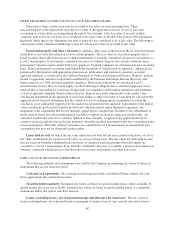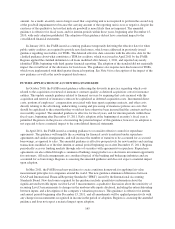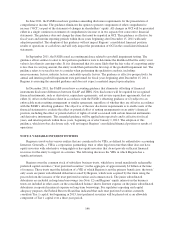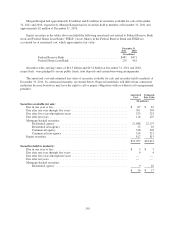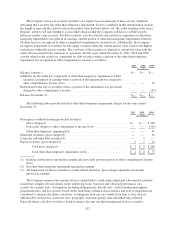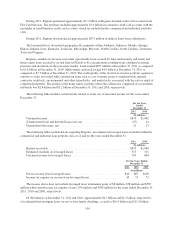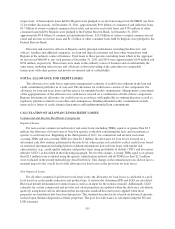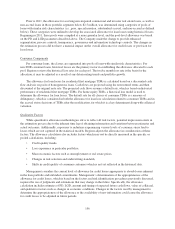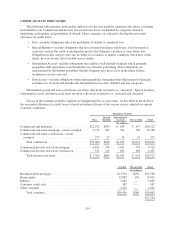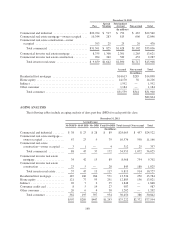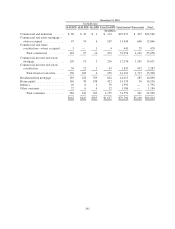Regions Bank 2011 Annual Report Download - page 176
Download and view the complete annual report
Please find page 176 of the 2011 Regions Bank annual report below. You can navigate through the pages in the report by either clicking on the pages listed below, or by using the keyword search tool below to find specific information within the annual report.
The Company reviews its securities portfolio on a regular basis to determine if there are any conditions
indicating that a security has other-than-temporary impairment. Factors considered in this determination include
the length of time and the extent to which the market value has been below cost, the credit standing of the issuer,
Regions’ intent to sell and whether it is more likely than not that the Company will have to sell the security
before its market value recovers. For debt securities, activity related to the credit loss component of other-than-
temporary impairment is recognized in earnings, and the portion of other-than-temporary impairment related to
all other factors is recognized in other accumulated comprehensive income (loss). Additionally, the Company
recognizes impairment of available for sale equity securities when the current market value is below the highest
traded price within the past six months. The cost basis of the securities is adjusted to current fair value with the
entire offset recorded in the statement of operations. For the years ended December 31, 2011, 2010 and 2009,
activity related to the credit loss component for debt securities where a portion of the other-than-temporary
impairment was recognized in other comprehensive income is as follows:
2011 2010 2009
(In millions)
Balance, January 1 .......................................................... $— $— $—
Additions for the credit loss component of other-than-temporary impairments of debt
securities recognized in earnings where a portion of the impairment was charged to
other comprehensive income (loss) ........................................... — — 47
Reductions for the sale of securities where a portion of the impairment was previously
charged to other comprehensive income ....................................... — — (47)
Balance, December 31 ....................................................... $— $— $—
The following tables provide details of other-than-temporary impairment charges for the years ended
December 31:
2011 2010 2009
(In millions)
Non-agency residentail mortgage-backed securities:
Gross charges(1) ...................................................... $— $— $238
Non-credit charges to other comprehensive income (loss) ...................... — — (191)
Other-than-temporary impairment(2) ...................................... — — 47
Municipal securities, gross charges(3) .......................................... — — 16
Corporate and other debt securities(3) .......................................... — 1 —
Equity securities, gross charges(3) ............................................ 2 1 12
Total gross charges(1) ..............................................$2$2$266
Total other-than-temporary impairment, net(2) ...........................$2$2$75
(1) Includes credit portion reported in earnings and non-credit portion reported in other comprehensive income
(loss).
(2) Net other-than-temporary inpairment reported in earnings.
(3) All impairment for thoese securities is credit-related; therefore, gross charges equals the net amount
reported in earnings.
The Company estimates the amount of losses attributable to credit using a third-party discounted cash flow
model that compiles relevant details on the underlying loans’ borrower and collateral performance on a
security-by-security basis. Assumptions including delinquencies, default rates, credit subordination support,
prepayment rates, and loss severity based on the underlying collateral characteristics and year of origination are
considered to estimate the future cash flows. Assumptions used can vary widely from loan to loan, and are
influenced by such factors as interest rates, geography, borrower specific data and underlying collateral.
Expected future cash flows are then calculated using a discount rate that management believes a market
152


